Insulators
An insulator is a material that does not easily allow the flow of electric current. Insulators have high electrical resistance, which means they prevent the movement of electric charges. This property makes them useful for a variety of applications, including electrical insulation, protecting against electric shock, and preventing energy loss.
Properties of Insulators
- Electrical Resistance: Insulators have high electrical resistance, which means they inhibit the flow of electric current.
- Non-Conductive: Insulators are non-conductive materials, meaning they do not conduct electricity easily.
- Thermal Insulation: Many insulators also have high thermal resistance, which makes them useful for preventing the transfer of heat.
- Examples: Common insulating materials include rubber, glass, plastic, wood, and ceramic.
Applications of Insulators
Insulators are used in various practical applications, including:
- Electrical Wiring: Insulating materials are used to cover and protect electrical wires, preventing the flow of current to unintended paths and reducing the risk of electric shock.
- Building Construction: Insulators are used as thermal insulation in buildings to reduce heat transfer and improve energy efficiency.
- Electronics: Insulating materials are used to prevent the flow of current between electronic components and protect against short circuits.
Study Guide
To understand insulators better, you can focus on the following key points:
- Define what insulators are and explain their role in preventing the flow of electric current.
- Identify common insulating materials and their properties, such as electrical resistance and thermal insulation.
- Explore practical applications of insulators in daily life, such as in electrical devices, building materials, and safety equipment.
- Discuss the importance of using insulators in electrical systems and the potential risks of not using them.
By studying these aspects of insulators, you can gain a comprehensive understanding of their significance and practical use in various fields.
.◂Science Worksheets and Study Guides Fourth Grade. Invertebrates - Animals without Backbones
Study Guide Invertebrates - Animals without Backbones
Invertebrates - Animals without Backbones  Activity Lesson
Activity Lesson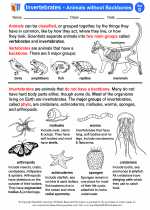 Invertebrates - Animals without Backbones
Invertebrates - Animals without Backbones  Worksheet/Answer key
Worksheet/Answer key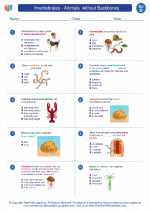 Invertebrates - Animals without Backbones
Invertebrates - Animals without Backbones  Worksheet/Answer key
Worksheet/Answer key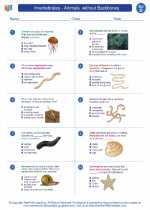 Invertebrates - Animals without Backbones
Invertebrates - Animals without Backbones  Worksheet/Answer key
Worksheet/Answer key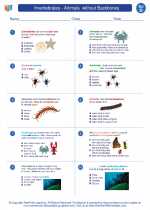 Invertebrates - Animals without Backbones
Invertebrates - Animals without Backbones  Worksheet/Answer key
Worksheet/Answer key Invertebrates
Invertebrates  Vocabulary/Answer key
Vocabulary/Answer key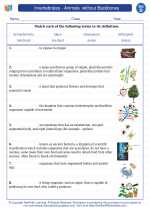 Invertebrates - Animals without Backbones
Invertebrates - Animals without Backbones  Vocabulary/Answer key
Vocabulary/Answer key Invertebrates - Animals without Backbones
Invertebrates - Animals without Backbones  Vocabulary/Answer key
Vocabulary/Answer key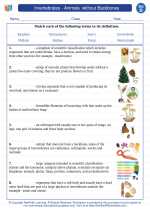 Invertebrates - Animals without Backbones
Invertebrates - Animals without Backbones  Vocabulary/Answer key
Vocabulary/Answer key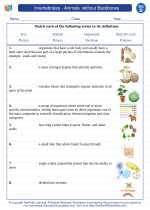 Invertebrates - Animals without Backbones
Invertebrates - Animals without Backbones  Vocabulary/Answer key
Vocabulary/Answer key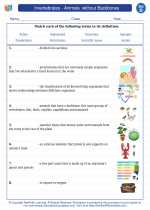 Invertebrates - Animals without Backbones
Invertebrates - Animals without Backbones 

 Activity Lesson
Activity Lesson
 Worksheet/Answer key
Worksheet/Answer key
 Worksheet/Answer key
Worksheet/Answer key
 Worksheet/Answer key
Worksheet/Answer key
 Worksheet/Answer key
Worksheet/Answer key
 Vocabulary/Answer key
Vocabulary/Answer key
 Vocabulary/Answer key
Vocabulary/Answer key
 Vocabulary/Answer key
Vocabulary/Answer key
 Vocabulary/Answer key
Vocabulary/Answer key
 Vocabulary/Answer key
Vocabulary/Answer key

The resources above cover the following skills:
Life Science: The students will use scientific skills and processes to explain the dynamic nature of living things, their interactions, and the results from the interactions that occur over time.
Diversity of Life: Explain how animals and plants can be grouped according to observable features.
Classify a variety of animals and plants according to their observable features and provide reasons for placing them into different groups.